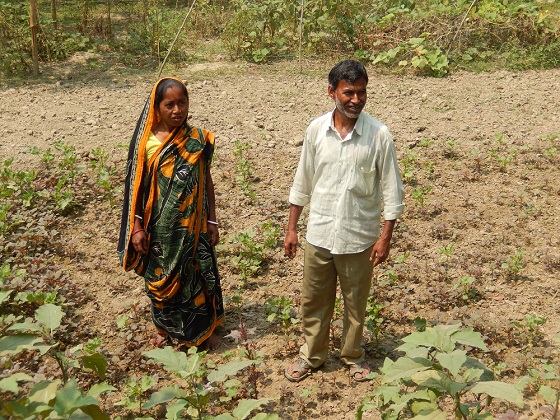Something like 165 million people live in Bangladesh in about the land area of Wisconsin. People count their land holdings in terms of 21 foot X 21 foot little blocks called decimals. Shukumar and his wife, Kojalrani, impressed me with their resourcefulness as they strive to make a living. World Renew has a fancy name for this kind of development: “Livelihoods.” We have special funding from the Canadian government (DFATD) to help us enlarge our livelihoods efforts. But, it really comes down to resourceful people, and people with the willingness to learn and apply what they are learning—like this man and his wife.
So what are Shukumar and Kojalrani up to? Well, through the World Renew program partnership with PARI development trust ( a self help organization) they have learned to multiply their potato harvest: before it was only 10 to 15 kg/Their 2 decimals, but this recent harvest was 80 kgs! Now…how did they do that? Well it’s all about the compost pile and the interesting insecticide. First, the insecticide: instead of buying it at the agricultural store, they have learned to make it. What’s the recipe? Mahagony seed and cow urine. I did not get to see this being done—but I did get a picture of the mahagony seed that they use. If I understood the story rightly, they actually use the pulp that’s around the seed before it gets dry.

And, then it’s all about the soil. In Bangladesh synthetic fertilizer, especially urea—has provided the nutrients that have enabled rice production to keep up with the hungry people. But, too much of this good thing can acidify the soil, and the double and triple cropping has diminished the amount of organic matter that keeps the soil soft and holds the nutrients. So, it’s rewarding for me that a composting training we did a few years ago has proven appropriate in enabling people like Shukumar and Kojalrani to grow more potatoes! Here’s a big compost pile in the starting stage:

Shukumar is part of the community organization, called “Peoples Institution” that World Renew’s partner, PARI, has organized in their village. He is actually one of the peoples institution supervisors who ensures that people practice what they have been taught.
For example, they have learned that in order to combat malnutrition, families, especially young children, should eat vegetables and fruits of varying colors: red, yellow, orange. And, that animal-sourced nutrients are more absorbed by the body. So, it’s wonderful to see red-leaf vegetable amaranth growing in the gardens. And, it’s great to hear Shukumar that out of 24 members training in fish rearing, 6 are trying the rice-interfish method and the other 18 are trying small fish ponds. In both methods they are trying to maximize the protein production and extend their use of precious water as long as possible after the rains end. The interfish method only works in the interval before things get too dry.

I did not write down the name of the farmer who showed us his “interfish” rice. But, he told us that he spent $51 to buy the fingerlings and expected to earn $130 when he sold the fish. That’s not a bad return, considering that there isn’t much extra labor involved in letting the fish feed and grow amid the rice.
I remember my dad’s lessons to me on the subject of teaching me how to work. These lessons started when I was 7 or 8. He said it was important for a man to know how to work so he could earn a living. I think he would have been pretty amazed at how the people of community where Shukumar and Kojalrani live are using their small plots of land, the water hyancinth weeds that grow in their ponds to make compost, the rice straw and bamboo to make baskets, the seeds of trees and cow urine to make insecticide—-learning to work with every space and every resource that God has given to them—to make a living.

